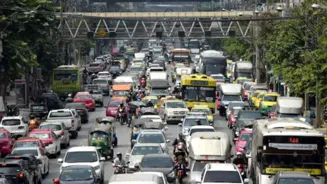The Supreme Court on Tuesday said there will be no coercive action against owners of end-of-life vehicles.
Directing a notice to be issued on the Delhi government’s plea seeking reconsideration of the 2018
ban on 10-year-old diesel and 15-year-old petrol vehicles, the Supreme Court said it will hear the matter after four weeks.
A bench headed by Chief Justice of India BR Gavai issued the order while solicitor general Tushar Mehta said the court may issue notice as the matter requires consideration.
“What happens is I have a vehicle I use from home to the court and then back…it could be 2,000 km. So I have to sell that vehicle after 10 years. Some other vehicles used as a cab may run 2 lakh km in one year,” Mehta argued.
The SC, however, said it cannot issue a notice without hearing the other side. “Issue notice. Returnable in four weeks. In the meantime, no coercive steps to be taken on ground that they are 10 years (diesel) and 15 years old (petrol),” the bench said.
The Delhi government has petitioned the court to review the ban on end-of-life vehicles, arguing it unfairly impacts the middle class without scientific backing. The plea follows criticism of the directive by the Commission for Air Quality Management (CAQM) and highlights advancements in pollution control technology.
WHAT IS THE END-OF-LIFE VEHICLES ISSUE?
At the core of the issue is the decade-old policy prohibiting diesel vehicles older than 10 years and petrol vehicles over 15 years from plying on the roads. The petition raises a key concern: should the end-of-life policy be determined by the age of the vehicle alone, or should emission levels and technological compliance – particularly Bharat Stage VI standards – be the decisive factors?
The rule stems from a 2015 order of the National Green Tribunal (NGT), which states that old diesel and petrol vehicles should not be allowed to run, park, or refuel in public areas. The SC supported this decision in 2018 due to the severe air pollution in Delhi-NCR. The CAQM recently asked fuel stations to stop supplying petrol and diesel to these “end-of-life” vehicles from July 1.
But the government policy had to be put on hold two days later following massive backlash. Eventually, in a U-turn, the Delhi government said age should not be the only factor to stop these vehicles from plying on the roads.





















